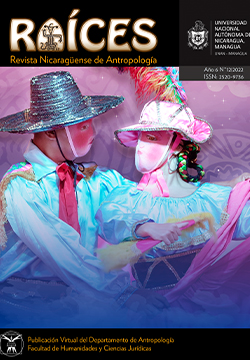Customary law
in the peasant community of Uripa
DOI:
https://doi.org/10.5377/raices.v6i12.15579Keywords:
customary law, community, organization, territory and conductAbstract
Anthropology as a social science points to global diversity with geographical and historical extension in every sense, making visible in full the social norms of the customary law of each society. The objective was to describe and analyze the legal custom in Uripa, of the lands community, social organization and sanctions in the community that energizes traditional patterns as well as ancestral behaviors in life daily, generating new forms of control in the awareness of values social, moral and legal. With this it is evident, the social interrelation in collective memory, the set of norms and behavior that regulates the community. Finally, the relevance of the result is the manifestations of practices that develop over time, the complexity of tenure, the administration, moral commitment and social security.
Downloads
579
References
Álvarez, A. (1986). Introducción a una teoría general del derecho. Buenos Aires: Editorial Astrea.
Comisión Andina de Juristas y Konrad Adenauer Stiftung (KAS), (2016). La participación de las comunidades campesinas y nativas de Cusco y San Martín en los gobiernos regionales y locales. Lima: Impreso en Impresión Arte Perú S.A.C.
De la Torre, L., y Sandoval, C. (2004). La reciprocidad en el mundo andino: El caso de Otavalo. Quito, Ecuador: Ediciones Abya-Yala.
Diez, A. (1999). Comunidades mestizas, tierras, elecciones y rituales en la sierra de Pacaipampa (Piura). PUCP (Fondo editorial) y CIPCA.
Fuenzalida, F. (1976). Estructura de la comunidad de indígenas tradicional. Lima: Instituto de Estudios Peruano (IEP).
Gonzales, E. (1986). Economía de la comunidad campesina. Lima: Instituto de Estudios Peruan (IEP).
Gluckman, M. (2009). Costumbre y conflicto en África. Los Olivos, Lima – Perú: Asociación Civil Universidad de Ciencias y Humanidades, Fondo Editorial.
Linton, R. (1945). Cultura y personalidad. México: Edit. Fondo de Cultura Económica.
Maine, H. (1861). Derecho antiguo. Madrid: Escuela tipográfica del hospicio Fuencarral
Mayer, E. (2004). Casa, chacra y dinero: economías domésticas en los Andes. Lima: Instituto de Estudios Peruanos IEP. (Estudios de la Sociedad Rural, 28).
Mayer, E. (1974). La regla del juego en la reciprocidad andina. G. Alberti& E. Mayer (eds.). Reciprocidad e intercambio en los andes Andes peruanos. Lima, Perú: IEP ediciones.
Mossbrucker, H. (1990). La economía campesina y el concepto “comunidad”: Un enfoque crítico. Lima. IEP ediciones.
Murra, J. (2002). En el mundo andino, población, medio ambiente y economía. Lima: IEP/PUCP.
Murra, J. (1975). Formaciones económicas y políticas del mundo andino. Lima: Instituto de Estudios Peruano (IEP).
Murra, J. (1987). La organización económica del estado Inca. México: siglo XXI editores, s.a.
Tau, V. (2000). El poder de la costumbre: estudios sobre el derecho consuetudinario en América hispana hasta la emancipación. Editorial. DIEZ-PICAZO.
Downloads
Published
How to Cite
Issue
Section
License
Copyright (c) 2023 © Universidad Nacional Autónoma de Nicaragua, Managua, UNAN-Managua

This work is licensed under a Creative Commons Attribution-NonCommercial-ShareAlike 4.0 International License.
This license enables reusers to distribute, remix, adapt, and build upon the material in any medium or format for noncommercial purposes only, and only so long as attribution is given to the creator. If you remix, adapt, or build upon the material, you must license the modified material under identical terms.




